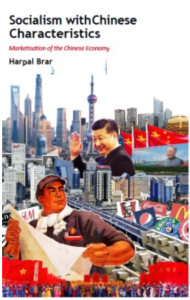 Harpal Brar, in this book that will soon be available via the CPGB-ML website, puts forward the Marxist-Leninist position that commodity production and circulation, the existence of the market, is incompatible with communism, and that, therefore, it is the function of socialism to abolish the market. Revisionism, on the contrary, following in the steps of bourgeois economists, believes in ‘market socialism’, according to which the continued existence of commodity-money relations under socialism, far from being merely a heritage of capitalism, is but an inherent need of the socialist economy, which requires not only the continuation of the market but also its expansion.
Harpal Brar, in this book that will soon be available via the CPGB-ML website, puts forward the Marxist-Leninist position that commodity production and circulation, the existence of the market, is incompatible with communism, and that, therefore, it is the function of socialism to abolish the market. Revisionism, on the contrary, following in the steps of bourgeois economists, believes in ‘market socialism’, according to which the continued existence of commodity-money relations under socialism, far from being merely a heritage of capitalism, is but an inherent need of the socialist economy, which requires not only the continuation of the market but also its expansion.
Through the ‘reforms’ over the last four decades, not only has a fully-functioning market been created in China, but also this market has become integrated with, and an appendage of, the world market. The law of value has become the regulator of production; and profit has become the supreme criterion of efficiency.
Harpal Brar’s latest book argues that what the Chinese comrades characterise as ‘socialism with Chinese characteristics’ is merely a euphemism for the marketisation of the Chinese economy.
Although the Chinese economy has made considerable progress and the CPC has made a success of operating a market economy, this has come at great cost, dealt with in the relevant pages of this book. This author applauds the rise of China but it is also his firm and considered view that, had the Chinese leadership not gone down the path of market socialism, had it continued to adhere to the system of centralised planning, China would have achieved a far greater and more balanced economic development independent of the vagaries, whims and caprices of imperialism, as well as the ravages of the market.
Comments are closed, but trackbacks and pingbacks are open.